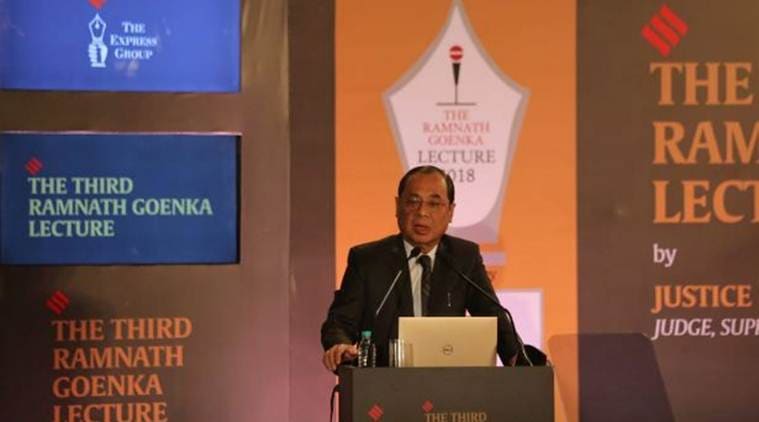 Justice Ranjan Gogoi also pointed out that the disparity that is prevalent because of the “two Indias” is “perceptible”. (Express Photo by Tashi Tobgyal)
Justice Ranjan Gogoi also pointed out that the disparity that is prevalent because of the “two Indias” is “perceptible”. (Express Photo by Tashi Tobgyal)
Underlining the divide between the “two Indias” — one that “believes it is the new order” and another that lives below a “ridiculously drawn poverty line” — both of which are “at conflict”, Supreme Court judge Justice Ranjan Gogoi on Thursday called for a “constitutional moment” of the judiciary which, he said, “has been long overdue”.
He also pointed out that the disparity that is prevalent because of the “two Indias” is “perceptible”. “There is an India that believes that it is the new order and there is an India that lives below a ridiculously drawn poverty line on daily wages in night shelters with no access to education or healthcare, let alone access to the courts of law,” said Justice Gogoi, delivering the Third Ramnath Goenka Memorial Lecture on Thursday.
The lecture series was launched by The Express Group in March 2016 to mark 25 years of the passing away of Ramnath Goenka, founder of The Indian Express. Earlier this year, on January 12, Justice Gogoi, along with three of his Supreme Court colleagues, Justices J Chelameswar (now retired), Madan B Lokur and Kurian Joseph, held an unprecedented press conference, making public a letter they had written to Chief Justice of India Dipak Misra in November raising questions on various issues pertaining to the functioning of the court, particularly the allocation of cases. “It’s a discharge of debt to the nation which we have done,” Justice Gogoi had said.
Full text of Justice Ranjan Gogoi’s speech at RNG Memorial Lecture
Speaking on ‘The Vision of Justice’ on Thursday, Justice Gogoi, while quoting from judgments — most recently, the 2015 ruling in Shreya Singhal v. Union of India on the issue of online speech — said: “The judgments beyond their bare letter, say that societal morality is fickle and not that, but constitutional morality that ought to dictate terms”. It is this notion of “constitutional morality” that was invoked recently in the Delhi Government vs the L-G case, and this week in the Supreme Court’s hearing of Section 377.
 Congress leader Abhishek Singhvi with former finance minister P Chidambaram attending the third Ramnath Goenka Memorial Lecture. (Express Photo by Abhinav Saha)
Congress leader Abhishek Singhvi with former finance minister P Chidambaram attending the third Ramnath Goenka Memorial Lecture. (Express Photo by Abhinav Saha)
Justice Gogoi noted that constitutional history with reference to the judiciary as a whole, and the Supreme Court, “would show that its own role has constantly evolved in the light of the socio-political context”. He said that if the 1970-1980 decade was when it expounded the Basic Structure Doctrine, in the 1980s, it constantly expanded the scope of Article 21, and by 1990s, it became somewhat of a “Good Governance Court” by innovatively interpreting constitutional provisions to address the inadequacies consequent upon executive and legislative inactivity.
 “Even if it came at a cost. To be ready to break, but not bend could be called obstinacy by some, and determination by others. Is it a matter of perspective? I do not know,” said Justice Gogoi. (Express Photo by Tashi Tobgyal)
“Even if it came at a cost. To be ready to break, but not bend could be called obstinacy by some, and determination by others. Is it a matter of perspective? I do not know,” said Justice Gogoi. (Express Photo by Tashi Tobgyal)
“In the first fifty years since our independence, the court has created a very sound jurisprudence which we continue to reap from. It is the inertia really that has kept us going till now. But the way things stand today, court processes are a trial even before the trial has begun. While I cannot say if it is a collective failure on our part, but for a nation governed by the rule of law, is it not a matter of concern that to this extent at least, we are defying the idea of inclusiveness? Not a reform but a revolution is what it needs, to be able to meet the challenges on the ground and to keep this institution serviceable for a common man and relevant for the nation,” he said.
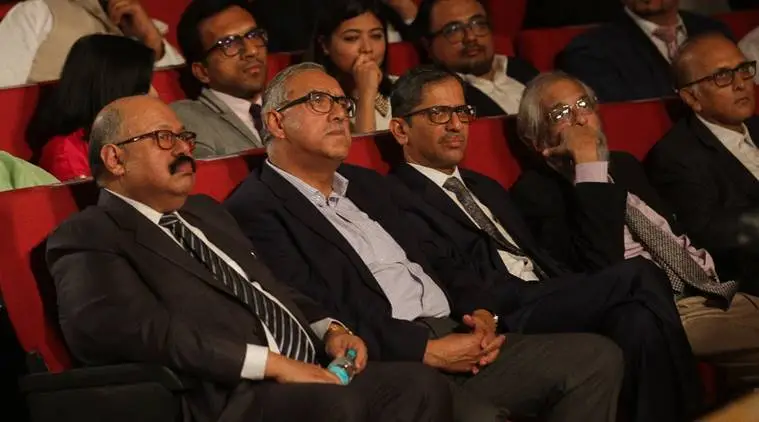 From (L-R): Hrishikesh Roy, Chief Justice, Kerala High Court, Deepak Gupta, Judge, Supreme Court, N V Ramanna, Judge, Supreme Court, Madan B Lokur, Judge, Supreme Court at the third Ramnath Goenka Memorial Lecture. (Express Photo by Abhinav Saha)
From (L-R): Hrishikesh Roy, Chief Justice, Kerala High Court, Deepak Gupta, Judge, Supreme Court, N V Ramanna, Judge, Supreme Court, Madan B Lokur, Judge, Supreme Court at the third Ramnath Goenka Memorial Lecture. (Express Photo by Abhinav Saha)
“But I will certainly say that the judiciary must certainly be more proactive, more on the front foot. This is what I would call as redefining its role as an institution in the matters of enforcement and efficacy of the spirit of its diktats, of course, subject to constitutional morality (= separation of powers) again. I will even go ahead to say that the institution, at all levels, needs to become more dynamic in the matters of interpretation of laws. And, this is what I mean to say by a constitutional moment of its own kind,” he said.
 From (L-R): Acting Chief Justice of Delhi High Court Justice Gita Mittal, Former Law Minister Ashwani Kumar, CPI leader D Raja and jurist Soli Sorabjee at the third Ramnath Goenka Memorial Lecture. (Express Photo by Abhinav Saha)
From (L-R): Acting Chief Justice of Delhi High Court Justice Gita Mittal, Former Law Minister Ashwani Kumar, CPI leader D Raja and jurist Soli Sorabjee at the third Ramnath Goenka Memorial Lecture. (Express Photo by Abhinav Saha)
Speaking on Ramnath Goenka, Justice Gogoi said he was someone who could speak truth to power. “Even if it came at a cost. To be ready to break, but not bend could be called obstinacy by some, and determination by others. Is it a matter of perspective? I do not know. And, I cannot say for others but as far as I am concerned, I only feel that we need to ask ourselves some questions: Where is the Goenka in us; his ideals; his values? Is that extraordinary phenomena losing his relevance today, after all these years?”
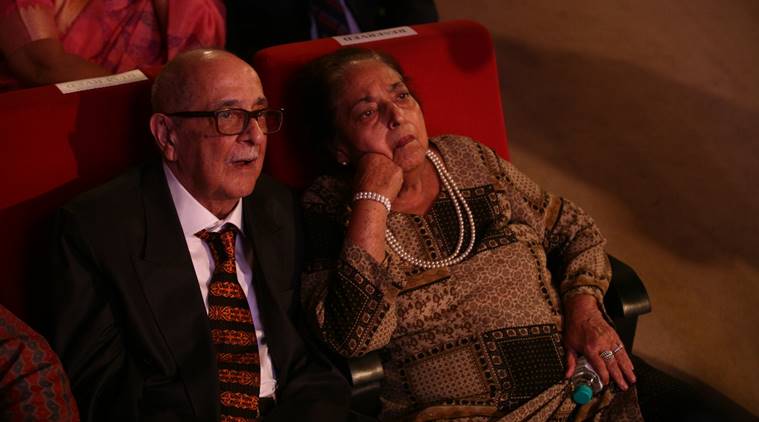 Jurist Fali S Nariman and his wife at the third Ramnath Goenka Memorial Lecture. (Express Photo by Abhinav Saha)
Jurist Fali S Nariman and his wife at the third Ramnath Goenka Memorial Lecture. (Express Photo by Abhinav Saha)
He said that if the judiciary wants to preserve its moral and institutional leverage, “it must remain uncontaminated”, “independent” and “fierce” at “all times”. He said the judiciary, as an institution, is being seen as a “course corrector, a leveller, a democratiser of sorts”. “And, since it is too well known that this country is on the cusp of an evolution, naturally it will have implications for this institution just as much,” he said.
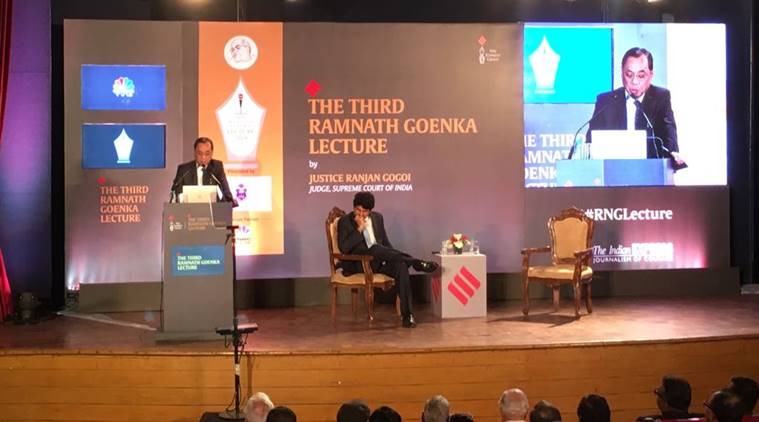 “I will only say that if it wishes to preserve its moral and institutional leverage, it must remain uncontaminated,” says Justice Gogoi. (Express Photo by Neeraj Priyadarshi)
“I will only say that if it wishes to preserve its moral and institutional leverage, it must remain uncontaminated,” says Justice Gogoi. (Express Photo by Neeraj Priyadarshi)
“I will only say that if it wishes to preserve its moral and institutional leverage, it must remain uncontaminated. And, independent. And, fierce. And, at all times. A chain is only as strong as its weakest link. So is an institution. And if introspection is where we have to begin, we might as well begin there. Perhaps, we can hope and endeavour that in the future, it is not our finality, but really the infallibility that should define us,” he said. He said the judiciary has been endowed with “great societal trust” and it is this fact that gives it credibility and legitimacy. “It is a very enviable spot for an institution,” he said.
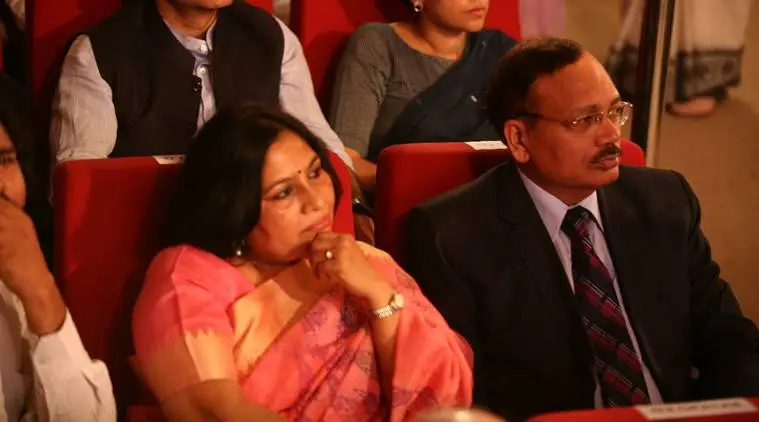 Punjab and Haryana High Court Judge Justice Surya Kant (Express Photo by Abhinav Saha)
Punjab and Haryana High Court Judge Justice Surya Kant (Express Photo by Abhinav Saha)
Justice Gogoi quoted Alexander Hamilton, a founding father of the United States of America, to warn of the “union of the judiciary with either of the other two branches” of the government. “While contemplating the US Constitution, he (Hamilton) had said that the judiciary is the weakest of the three branches because it neither has the force of the Executive nor the will of the Legislature, but only judgment. This, and which I agree with absolutely, he said, was the ‘simple view of the matter’,” said Justice Gogoi.
 Justice Ranjan Gogoi (right) and Anant Goenka Executive Director of The Express Group at the third RNG Lecture in New Delhi on Thursday. (Express Photo by Abhinav Saha)
Justice Ranjan Gogoi (right) and Anant Goenka Executive Director of The Express Group at the third RNG Lecture in New Delhi on Thursday. (Express Photo by Abhinav Saha)
“The complex view is this. And which he was wise enough to warn about over two centuries ago. He had said that while the civil liberties will have nothing to fear from the judiciary alone, they will have everything to fear from the union of the judiciary with either of the other two branches,” he said. Agreeing with Ramnath Goenka’s view that “fierce independence” is the “bedrock of justice”, Justice Gogoi said, “but I would like to add that ‘independence’ must always be responsible with due regard to established constitutional values.”
 Former Chief Justice of India Rajendra Mal Lodha (Express Photo by Abhinav Saha)
Former Chief Justice of India Rajendra Mal Lodha (Express Photo by Abhinav Saha)
While Raghuram Rajan, then Governor of the Reserve Bank of India, delivered the first Ramnath Goenka Memorial Lecture, former President Pranab Mukherjee did the honours at the second lecture in May 2017.